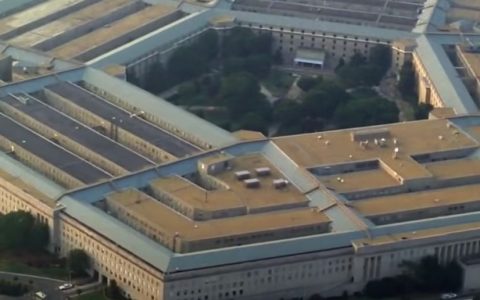
The patience of President Trump is wearing thin. He will play hard ball if he has to.
That’s why the White House is preparing a silver bullet to force Congress to pass legislation Trump has been waiting for.
How a Clever Tactic Could Allow Trump To Slash Billions Without Congress
The Trump administration is eyeing a powerful, yet rarely used, strategy to enact sweeping spending cuts, potentially bypassing a hesitant Congress to achieve fiscal discipline. Known as a “pocket rescission,” this procedural maneuver could allow the White House to implement billions in reductions identified by the Department of Government Efficiency (DOGE), reinforcing President Trump’s commitment to streamlining government waste.
In June, the Republican-led House passed a $9.4 billion rescissions package aimed at curbing unnecessary federal spending. This move aligns with the administration’s goal of prioritizing taxpayer dollars for essential programs. However, Senate Appropriations Committee Chair Susan Collins of Maine has expressed doubts about the package, creating uncertainty about its passage in the Senate. Her hesitation highlights the challenges of navigating a divided Congress, even with GOP control.
The pocket rescission, rooted in the Impoundment Control Act (ICA) of 1974, offers a workaround. Under this law, the president can request to rescind previously appropriated funds, freezing them for 45 days while Congress decides whether to approve or reject the request. If the request is made late in the fiscal year—specifically with fewer than 45 days remaining—the funds automatically expire, as most federal appropriations cannot roll over into the next fiscal year. This tactic could enable the administration to enact DOGE’s proposed cuts without needing Senate approval.
Russell Vought, Director of the Office of Management and Budget (OMB) and a veteran of Trump’s first term, has championed this approach. “It’s a provision that has been rarely used, but it’s there,” Vought told Axios. “And we intend to use all of these tools. We want Congress to pass it where it’s necessary; we also have executive tools.” His advocacy draws on historical precedent, notably President Gerald Ford’s use of a pocket rescission in 1975, though the strategy has remained dormant since.
The idea of leveraging pocket rescissions isn’t new for the Trump team. In 2018, the OMB considered this approach but did not follow through, according to The New York Times. That same year, a $15 billion rescissions package proposed by the administration failed to gain traction in the Senate, highlighting the political hurdles of such cuts. Vought’s renewed focus on this tactic reflects a determination to avoid similar roadblocks this time around.
For fiscal conservatives, the pocket rescission is an appealing tool, especially given concerns that moderate Republicans in Congress might not fully support the administration’s aggressive cost-cutting agenda. The current rescissions package, which must be approved by the Senate by July 18, faces a tough path. If Collins, a key figure on the Appropriations Committee, refuses to advance the package for a floor vote, its chances of passing dwindle significantly.
NPR and PBS = DEFUNDED ✅
The House just passed President Trump's rescissions package, enacting @DOGE cuts to the Corporation for Public Broadcasting.
Tax dollars will NOT go towards indoctrinating children with radical leftist ideology.@SenateGOP, it's your turn to act. pic.twitter.com/I5ZsceeQ55
— Oversight Committee (@GOPoversight) June 12, 2025
Collins has voiced specific objections, particularly to $500 million in proposed cuts to a global HIV/AIDS prevention program. Her stance illustrates the tension between fiscal restraint and maintaining funding for programs with broad bipartisan support. For the Trump administration, which prioritizes efficiency, these cuts are seen as critical to reducing bloated budgets and redirecting resources to domestic priorities.
Yet, the pocket rescission strategy is not without risks. In 2018, the Government Accountability Office (GAO), a legislative watchdog, argued that the ICA “does not permit the withholding of funds through their date of expiration.” Collins echoed this sentiment, calling the maneuver “illegal” and contrary to “the will of Congress and the constitutional authority of Congress to appropriate funds” in a recent Politico interview.
Despite these criticisms, some experts argue that the ICA’s text does not explicitly prohibit pocket rescissions. Jack Fitzhenry, a legal fellow at the Heritage Foundation, noted, “[The GAO report] is not a bad piece of legal work, but it doesn’t strike me as a lockdown answer to the question. It essentially requires whoever is interpreting [the ICA] to read into the language a limitation that is not there, that Congress did not bother to put into the statute.” This perspective suggests the administration could have legal grounding to proceed.
The Center for Renewing America, a think tank founded by Vought, has also defended the strategy. Wade Miller, a senior advisor at the organization, wrote, “Congress has the power to follow GAO’s recommendation, but in the last fifty years, it has not chosen to amend the ICA. If the executive branch decides to use this process, the deployment of a rescission with fewer than forty-five days remaining in the fiscal year is a statutorily and constitutionally valid strategy.” This argument bolsters the administration’s case for acting decisively.
However, Fitzhenry cautioned that legal challenges are likely if the administration pursues this path. “If the Trump administration ever attempts this, it will be greeted with skepticism from hostile pockets in Congress and potentially in courts, too,” he said. “This doesn’t mean their interpretation is wrong, but I think they’ll be fighting an uphill battle.” Such opposition could complicate the administration’s efforts, but it may not deter a team known for pushing boundaries.
The pocket rescission represents a creative use of executive power, aligning with Trump’s reputation for finding innovative ways to advance his agenda. By leveraging DOGE’s recommendations, the administration aims to deliver on promises to reduce government waste and prioritize American taxpayers. The strategy’s success hinges on navigating both political and legal obstacles, but its potential to reshape federal spending is undeniable.
As the July 18 deadline approaches, the administration faces a critical juncture. The pocket rescission could serve as a game-changer, allowing Trump to bypass congressional gridlock and implement DOGE’s vision for a leaner government. Whether this bold move succeeds will depend on the administration’s ability to withstand scrutiny from lawmakers like Collins and potential legal challenges.
The debate over pocket rescissions highlights a real struggle over fiscal responsibility and executive authority. For Trump and his allies, it’s an opportunity to demonstrate their commitment to cutting waste while testing the limits of presidential power.
Stay tuned to the DC Daily Journal.





